| ||||
| ||||
| Moderated by: Greg Fletcher | Page: 1 2   |
|
|||||||||||||
| Air box hose size | Rate Topic |
| Author | Post |
|---|
| Posted: 08-15-2020 09:13 pm |
|
1st Post |
|
Art DeKneef Member
|
I am making some plugs for the Lotus airbox found on the 907. When they are finished I will make the molds so I can make more air boxes. There will be an air box for the Zenith-Stromberg carbs and one for the Dellorto and Weber carbs. Before I get too far along I wanted to check if there was any hose size other than 3" being used. So if some of you could respond with the size of the hose you are using with your air box that would help me alot. And by airbox I mean the type that came with the Lotus cars, not the type used with the air muffler type of the JH. Thanks. Art
|
||||||||||||||
| |||||||||||||||
| Posted: 08-16-2020 05:40 pm |
|
2nd Post |
|
Steve Johnson Member
|
Hello Art, did the air box that came with lotus cars and the type used by our muffler style on our JH's both use the same backing plate? i have a new (from Roby i think, that oi bought when i got my Dells) but never used, using K&N but may like to change to a new style lotus that draws fresh air from from front of car. Steve santa ana ca.
|
|||||||||||||
| ||||||||||||||
| Posted: 08-16-2020 09:55 pm |
|
3rd Post |
|
Art DeKneef Member
|
Steve, I don't think so. From the pictures I have seen the corners are more rounded than the Lotus air boxes I have here. And there is no air filter mounted there. It was inside the muffler. I am making everything so that they use the regular K&N air filter. Hopefully these parts will be interchangeable with the existing air boxes in case something breaks. I have an air hose that I am using as the piece to make sure the round port fits with the hose. That's why I asked the question on hose size. So if you already have the backing plate and filter, then one of the tops should fit. The only question would be the clips to hold everything together.
|
||||||||||||||
| |||||||||||||||
| Posted: 08-18-2020 06:26 pm |
|
4th Post |
|
Esprit2 Member
|
Art, As I recall, the airbox you are pulling molds from has a square spigot where most would be round to accept a flex duct. That was a Lotus Excel airbox, and a thermo-valve attached to the square, and the far end of the valve was round to accept a flex duct. With out that valve as a square to round adapter, it would be best if your airbox simply had a round spigot. I don't have any Excell dimensions for you, but on the late 1970s Lotus Elite-Eclat air boxes, the spigot for the flex duct is two inches long. It starts out a little smaller for ease of starting the flex duct onto the end, then at the one inch mid-point, it steps up a bit larger in diameter for a more snug fit. I've measured two... One starts at 85.5mm (3.37") and steps up 1mm to 86.5mm (3.41"). The other is 1mm larger in diameter, starting at 86.5mm (3.41") and stepping up 1mm to 87.5mm (3.45"). They're visually very similar, but a closer inspection shows they came from different molds. So I wonder if the 1mm increase in diameter was intentional, or just a casual difference on a non-critical part? The flex duct is somewhat compliant, and it's a slight stretch fit onto the spigot. So with that fit, the flex duct would stay in place without a hose clamp... although I used one. The Elite-Eclat duct wasn't just off-the-shelf flex duct. It was a custom part that tapered to a smaller diameter at the forward inlet end. Unfortunately, it was a Lotus-only part and is no longer available new, so not a help to you. I suggest that you choose a readily available flex duct in the 3 3/8" - 3 1/2" ID range, and make your airbox's spigot to fit whichever duct you choose. If it helps fitting everything into a snug engine bay, then I don't think there would be a problem with using a smaller ID flex duct. The small inlet end of the tapered Lotus duct was only about (guessing from memory) 2.5" ID. Laundry dryer flex duct won't work, it needs to be rated for automotive or aviation engine bay use. Check the websites for Pegasus Racing, Racers Warehouse, and Aircraft Spruce & Specialty. FYI... in order to quiet the induction roar, Lotus laminated the outside of the airboxes with a rubber material that's about 1/8" thick. It's strong & fiber re-inforced... it reminds me of conveyor belt material. Plain rubber sheet would be easier to work with, but it would have to be an automotive grade that could put up with heat and petroleum products. Use a high temperature adhesive. Regards, Tim Engel
|
|||||||||||||
| ||||||||||||||
| Posted: 08-19-2020 02:35 am |
|
5th Post |
|
Art DeKneef Member
|
Hi Tim, Correct. The one I have here is the later square style. I made the plug to have a round end. I also made one that is similar to the earlier style where the box lid is a little bigger. It doesn't have the side step down the later one has. Figures that Lotus would use a custom size. That was my concern for the round end. So I got a 3" hose from Amazon and am using that as a guide. https://www.amazon.com/Spectre-Performance-8741-Black-Duct/dp/B000BPZ55Y/ref=sr_1_6?crid=PTRH9WDUCNKF&dchild=1&keywords=intake+hose&qid=1597800123&sprefix=intake%2Caps%2C236&sr=8-6 In looking at the different sites I figured the 3" would likely be the most common. That's why I asked the question here. That's interesting you mentioned the rubber covering on the outside. The later style I have here doesn't feel like that at all. Feels and sounds like plastic. So far these will be able to use the lotus air filter. At least the one I have here fits.
|
||||||||||||||
| |||||||||||||||
| Posted: 08-19-2020 07:08 pm |
|
6th Post |
|
Esprit2 Member
|
Art, I don't know that the end of the Lotus duct that actually slipped onto the airbox was a non-standard size. It's just that the rest of the length of the duct was uniquely Lotus in it's tapered shape with a couple of bends formed into it. When the early Elite-Eclat airbox was made, England & Lotus had not yet fully embraced the metric system. It may have been inch or metric. By the time the Excel airbox was done, Lotus was into full metric mode. But you're on the right track... select a flex duct that will be easily available now, and match the airbox to it. The rubber covering Lotus used for sound insulation was not 'artfully' applied, and would have been very obvious if it were present. Especially after all these years, since the adhesive is usually letting go by now. Regards, Tim Engel
|
|||||||||||||
| ||||||||||||||
| Posted: 08-24-2020 01:24 am |
|
7th Post |
|
discogodfather Member
|
Just a word on the experience I just had building an airbox system out of a pipercross 600 universal airbox: 4" is way better than 3" fpr Lotus 907 engines. I started with a 3" version and quickly abandoned it for the 4" size. I felt as if a 3" hose barely could support 200hp in terms of CFM. Even 4" seems somewhat constricted, especially when using a cone filter in the front of it that is sealed into a cold air intake. It might be a good idea if you do a copy to do what most manufacturers do when they have a group that wants either 3" or 4" (like NACA ducts or brake cooling ducts) is to include a step that can support 3" or 4". If you want 4" you just cut away the 3" and a small taper comes to a 4" ledge. Just a thought, if you wanted to sell this to more people looking for more flow. The Lotus airbox design has a ton of volume so it masks a lot of high rpm flow problems by simply having a lot of air in reserve.
|
||||||||||||||
| |||||||||||||||
| Posted: 08-25-2020 12:23 am |
|
8th Post |
|
Art DeKneef Member
|
Thanks for the information and suggestion. I did think of a 4" opening but decided to go more stock for now. Or what might be the majority out there right now. There was a picture of an airbox in a Lotus that looked like the opening might be 4". When I finish these I can make another top that has a 4" opening.
|
|||||||||||||
| ||||||||||||||
| Posted: 08-26-2020 05:20 pm |
|
9th Post |
|
Esprit2 Member
|
I visited a Turbo Esprit owner yesterday. While I was there, I measured the airbox inlet at 3 3/8" with no step. The duct to the airbox is constant diameter. However, the airbox is remotely located (not on the carb inlets), and the duct after the airbox tapers to about 2.5" ID. Another one of those Lotus-only 'formed' ducts. Regards, Tim Engel Last edited on 08-27-2020 06:15 pm by Esprit2 |
||||||||||||||
| |||||||||||||||
| Posted: 08-29-2020 06:17 am |
|
10th Post |
|
discogodfather Member
|
Forced induction vs. NA probably plays a big role in the shape and size of the airbox, as well as the length of any trumpets/air horns you want to fit inside the airbox. Pipercross in the UK told me for any airbox, the length of the gap between the mouth of the bell and the wall of the filter or airbox itself needs to be at least 19mm. That gives a good idea of why Lotus made the airbox so deep, considering on the DHLA models the stock trumpets were around 30-40mm? Pipercross also told me it's always advantageous to fit the largest box and largest filter that size constraints will allow, just as a general rule. This Pipercross 600 pictured was too small for a higher performance high compression 907 (still 2 liter). It worked but the slim profile and cone filter, even with a full 4" ducting to the front of the bumper, caused some constriction in the system enough to need re-jetting, so I gave up on it. The cone filter was only 4.5" in diameter, kind of on the small side, and it was probably the major flow restriction. Even with the gap between the edge of the ram horn mouth and the airbox being 22mm, it didn't seem like enough. I ended up just using a massive foam breadbox shaped setup and it doesn't need any adjustment with or without the filter, which I always have taken as the best indicator that there is no restriction in the system. 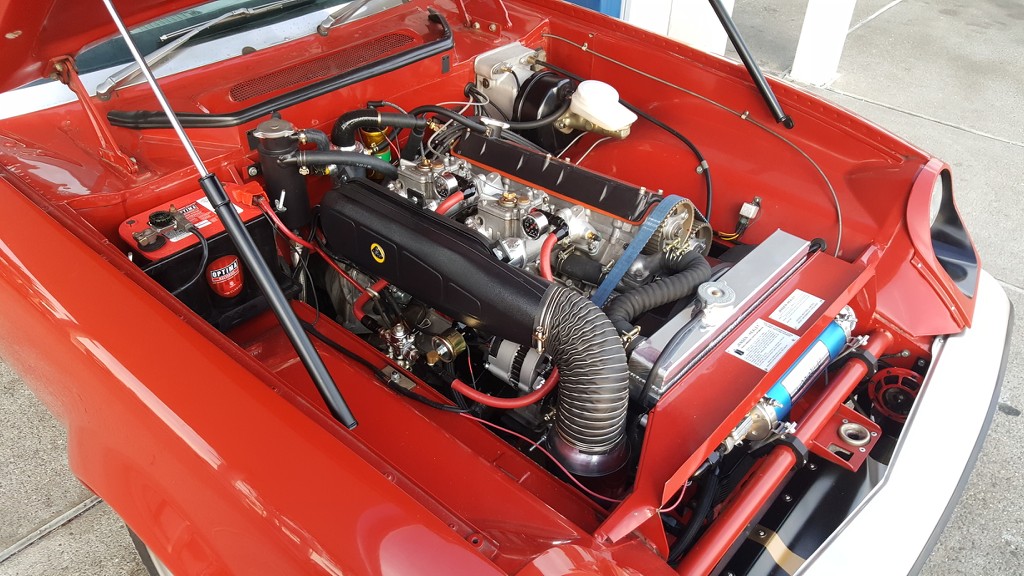 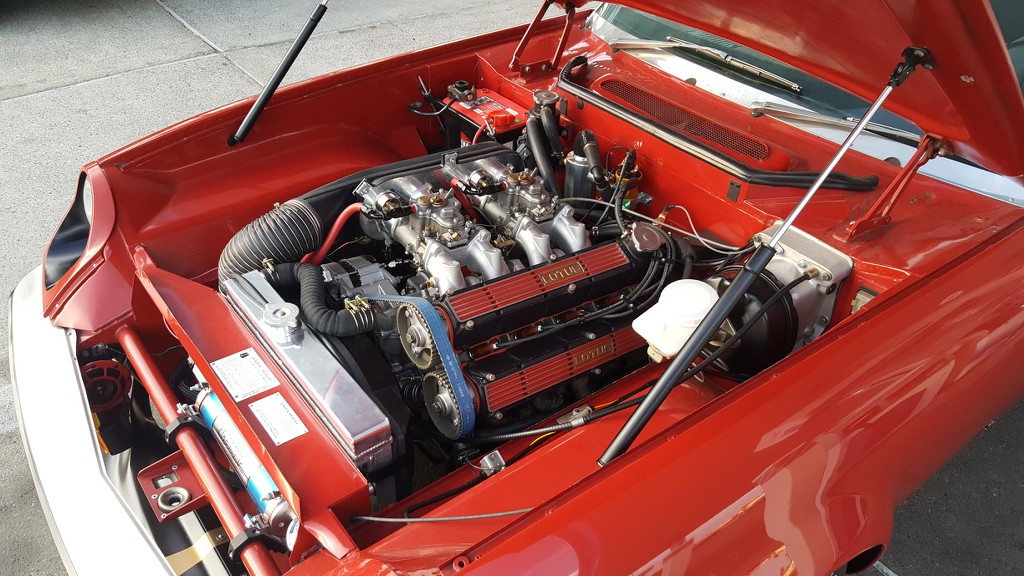 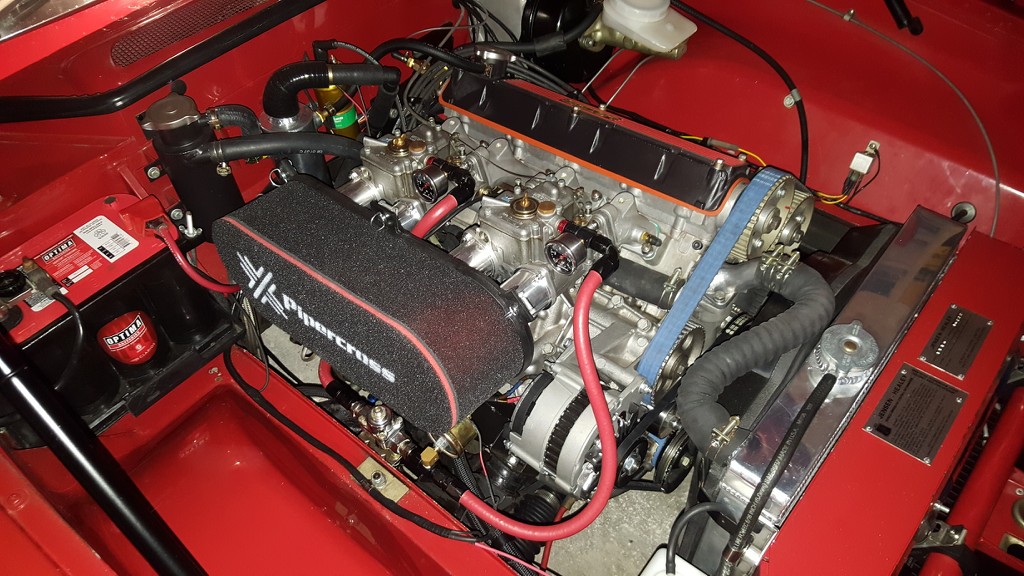
|
|||||||||||||
| ||||||||||||||
| Posted: 08-29-2020 02:15 pm |
|
11th Post |
|
redracer Member
|
Disco: sorry you've had such a difficult time with the airbox. On the Huffaker race car, they built a very large aluminum box with a 4" duct going up to the front cowling. This would give a somewhat "high pressure" area with very little turbulence, somewhat like the Lotus setup but with a much larger airbox. The top was hinged so either long or short trumpets could be changed easily.
|
||||||||||||||
| |||||||||||||||
| Posted: 08-30-2020 03:27 am |
|
12th Post |
|
Art DeKneef Member
|
Thanks for the extra info and pictures. I was in the garage working on the other parts and thought I would mock up a top with a 4" opening since I had leftover foam taking up space. What size are those struts you have holding the hood open? I'm looking to fit some to my hood.
|
|||||||||||||
| ||||||||||||||
| Posted: 08-30-2020 09:20 am |
|
13th Post |
|
discogodfather Member
|
Art DeKneef wrote:
These are 13" shocks that extend out about 11" for a total of 24" in length. They are ok for clearance and approximate the stock hood opening height, maybe a little less. Not sure where I got them but I vaguely remember they had something to do with a Toyota? or Nissan hatchback or van from the 90's. I had to make the top mount brackets. If your interested I can take some more pictures, these have worked perfectly for 15-20 years now.
|
||||||||||||||
| |||||||||||||||
| Posted: 08-30-2020 08:03 pm |
|
14th Post |
|
Esprit2 Member
|
Disco, I'm sorry to hear you have been having trouble getting the carbs/ airbox sorted, but I also think you're barking up the wrong tree. The airbox's inlet diameter isn't restricting the airflow and 'throttling' the engine. The Lotus Esprit S2 and two Eclats that I used to autocross all ran standard Lotus airboxes, filter elements and flex ducts. And they would all happily scream right past redline. The Esprit's 907 was converted to 2.2 liters and hotrodded to about 230 hp, and I would often hit 8000 rpm during an autocross run. And that was a paranoid limit self-imposed by me and my right foot... the engine itself was still screaming for more when I lifted. It was NOT running out of breath. If a 2.2 hotrod was NOT experiencing restricted breathing with a stock Lotus airbox, then I have a hard time believing your 2.0 is. Something else is also at play, and I recommend that you also look for the less obvious cause. Breathing hot under-bonnet also reduces power. Resolve whatever your unknown problem is, and the engine will be happier breathing cooler outside air via the closed airbox. Regards, Tim Engel
|
|||||||||||||
| ||||||||||||||
| Posted: 08-30-2020 08:05 pm |
|
15th Post |
|
Art DeKneef Member
|
Thanks. With those measurements I can go locate some easier now.
|
||||||||||||||
| |||||||||||||||
| Posted: 08-30-2020 09:52 pm |
|
16th Post |
|
discogodfather Member
|
Esprit2 wrote:Disco, I'm sorry to hear you have been having trouble getting the carbs/ airbox sorted, but I also think you're barking up the wrong tree. The airbox's inlet diameter isn't restricting the airflow and 'throttling' the engine. Yeah it's probably just the very slim design of the pipercross 600, it was designed to go into very tight spaces. I don't think it has the volume necessary. It's wall is also too close to the ram horn aperture. The airbox seems to, in general, kill the induction noise, so for now I can't live without the beautiful carb noise. I have been thinking about going the hood route, which is to build a naca duct like box that would be fed from the hood, but it's a project for another time. There is a guy I met recently, Rob Rickner, who runs a Lotus parts business in Vermont called RR Flyer Classics, who has airboxes. I believe they are from later Eclat's, they are of course used but the prices seem reasonable. But if Art's project pan's out, I would love to buy one to experiment with.
|
|||||||||||||
| ||||||||||||||
| Posted: 08-31-2020 06:02 am |
|
17th Post |
|
PF18602 Member
|
Art, here’s a link to instructions made by Frank Schwartz on a good way to add gas struts to the bonnet. http://www.villageautobodyshop.com/mitch/struts.html I found the right struts through rock auto for $16 a piece. They are SACHS brand, SG127001. Patrick
|
||||||||||||||
| |||||||||||||||
| Posted: 08-31-2020 06:41 pm |
|
18th Post |
|
Esprit2 Member
|
discogodfather wrote:Yeah it's probably just the very slim design of the pipercross 600, it was designed to go into very tight spaces. I don't think it has the volume necessary. It's wall is also too close to the ram horn aperture.Ahhh... you have airhorns inside the airbox? How long are they? Or more to the point, how close do they come to the opposite wall? If you're running 45mm ID air horns, then 45mm is also the minimum required gap between the end of the air horn and the opposite wall. Sure, the air horn can be part of the overall 'tuned length' of the inlet runner. But in any airbox or enclosed air filter (even just a K&N chrome oval), you MUST have adequate clearance off the end of the air horn. In that case, you're better off running the shortest airhorn available just to get the smooth airflow lead-in provided by the shaped, curved inlet. You loose more due to encroachment than you gain with a longer airhorn. If you have long airhorns that end up too close to the far wall of the airbox, then the small gap is choking off the inlet airflow. Try running without the air horns. If that improves the situation, then consider buying a set of short, stubby airhorns just to get the smooth entry. My current daily driver is a Lotus Europa with K&N oval filters on Weber DCOEs. I'm running without airhorns because the long ones I have for it come too close to the far wall and restrict top end performance. discogodfather wrote: The airbox seems to, in general, kill the induction noise, so for now I can't live without the beautiful carb noise.Simple open air filters, like K&N or the Pipercross pretty much let all the noise out. An enclosed, 'hard' airbox does muffle the induction roar a bit, and a rubber coated Lotus airbox muffled it even more. But you can still hear it, just at a lower volume. I've always used my Lotus cars as daily drivers, and there was a time when I was driving my Esprit S2 on a seven hour round trip every other weekend. The loud induction roar got to be a little tiring, and the reduced volume of the rubber coated Lotus airbox was more than welcome. That which is fun in small doses becomes a burden in extended exposure. Enough is enough. I still like the sound. But I think I'd also like a volume control knob. Regards, Tim Engel Last edited on 08-31-2020 08:58 pm by Esprit2 |
|||||||||||||
| ||||||||||||||
| Posted: 09-01-2020 04:14 am |
|
19th Post |
|
discogodfather Member
|
Esprit2 wrote:Ahhh... you have airhorns inside the airbox? How long are they? Or more to the point, how close do they come to the opposite wall? I used to run this engine just open with no air filter and about 80mm trumpets. I felt like this benefited the mid range and top end the best on this setup. No airbox would fit the 80mm rams, so I looked for other options including building my own. I realize now the diameter of the horn needs that length of clearance, that is a great point. I knew this earlier but Pipercross told me to at least have 19mm to the wall, which isn't enough. What I needed was an airbox that would allow the long trumpets and still give it clearance. I considered making some kind of box that would fit at or towards the edge of the rams, so that I could stand off the airbox by the needed length. Otherwise, if you look at the Lotus airboxes, they aren't big enough for the longer rams. The name of the game in these airbox designs is do you place the trumpet inside of the airbox (so the airbox itself just bolts to the face of the carb) or do you look for other options. I felt like making a airbox big enough to accept a long ram would make the airbox HUGE, so I didn't really go down that route. I found an Australian company called EFI that makes some nice universal fiberglass boxes that probably would work clearance wise. But it was big and a little dopey to me: 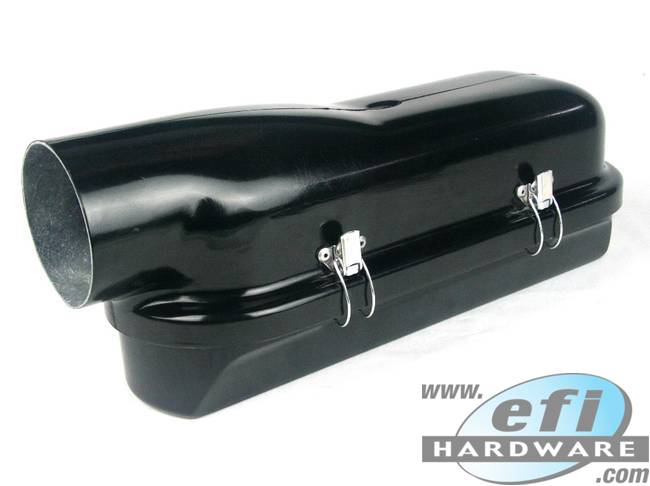 Then I found the Pipercross 600, which is a very low profile design (only about 40mm thick):  The challenge was to get the long rams to work in this setup. I found another Australian company called RHD that had what are called "runner extensions". 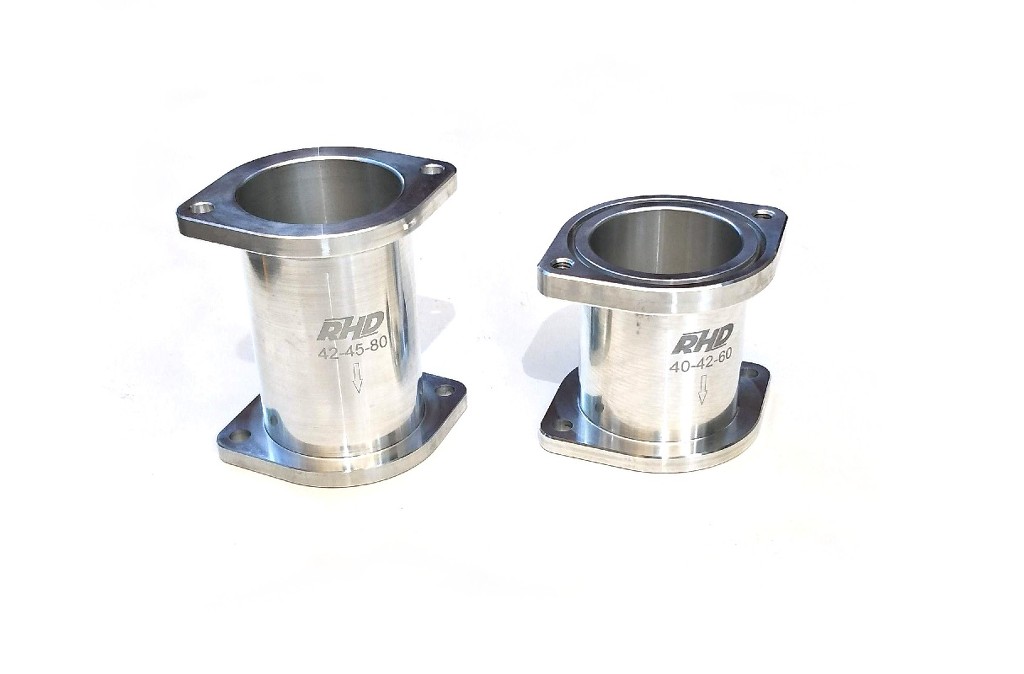 I realized with the backing plate on the Pipercross 600 (which they sell in a Talbot Sunbeam Lotus config which fits DCOE and DHLA spacing) could bolt to this and then I could use some 30mm trumpets, for a combined length of around 90mm. This is how it came out: 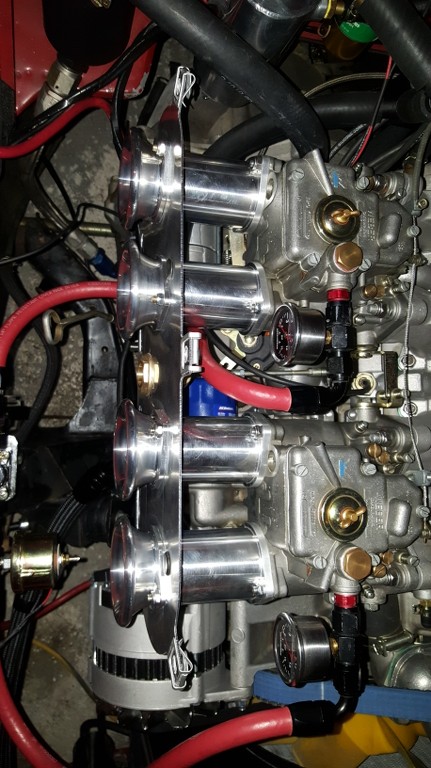 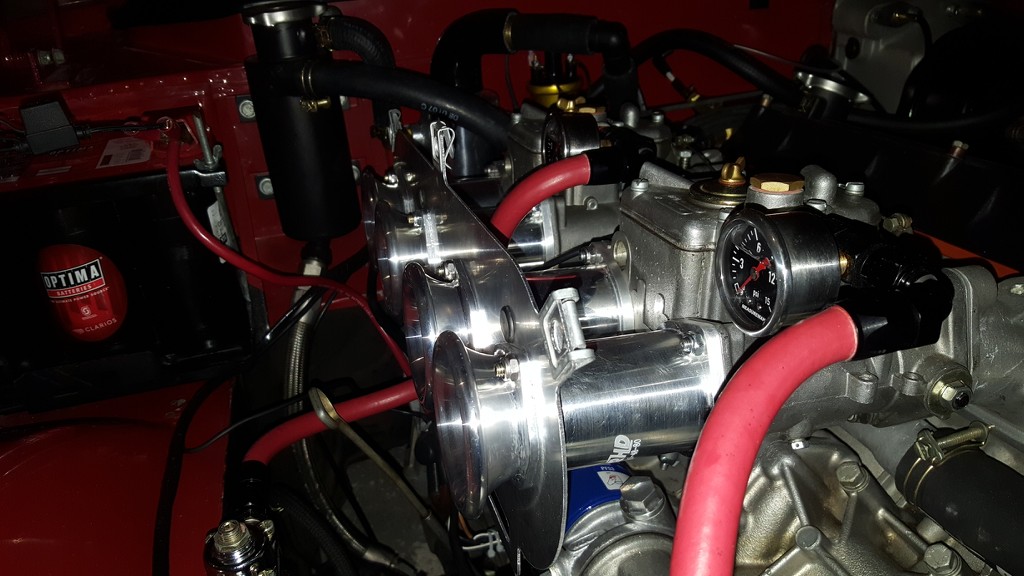 Problem was this: the airbox edge was still too close to the trumpet. Like you said Tim, if I ditch the rams it will probably be ok, or run what they call "lip rams" that are basically just round lips that bolt to the edge, maybe only 15mm in length). You can see here it was very tight in there: 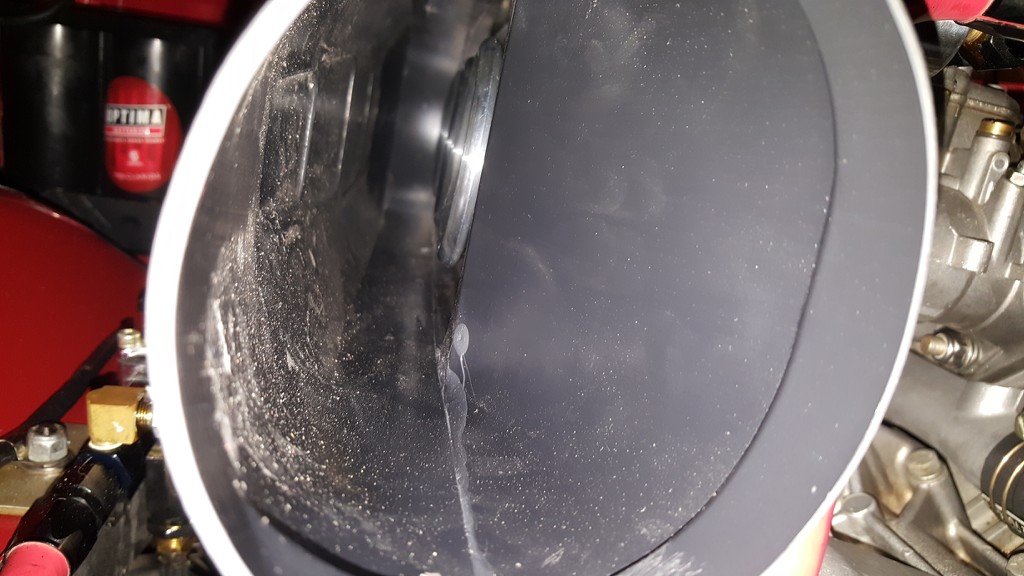 I might come back to this design based on some of your input eventually, probably using no rams with the setup. The Pipercross 600 is just so thin, I don't know if it will be able to handle the requirements. 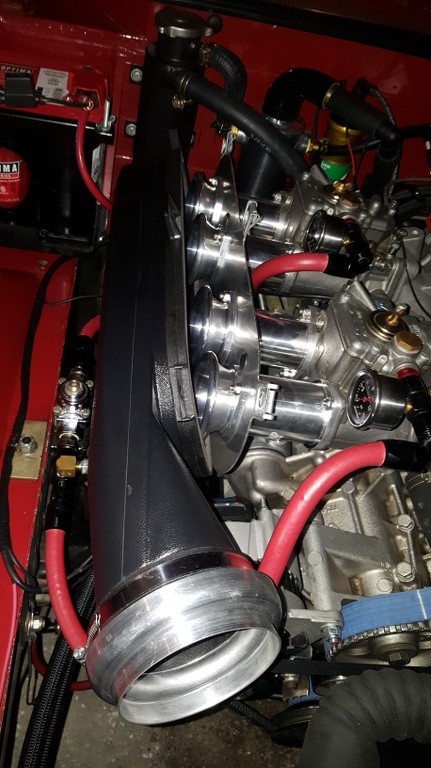 Last edited on 09-01-2020 04:17 am by discogodfather |
||||||||||||||
| |||||||||||||||
| Posted: 11-30-2020 01:23 am |
|
20th Post |
|
Art DeKneef Member
|
For those following or interested here's the latest. I tried attaching photos but kept getting the error "file size too big' even though the files were around 500K in size. The first pair I did were based on the ZS carbs. The base plate and modified air box can out good. But I forgot to consider the bolts or clamps that will hold it together. Need to think on that some. I then took my plug of the later style Lotus air box (rectangle outlet) and made the outlet round for 3" inch hose and did it as a 2 piece mold. Waxed and polished several times before applying the gelcoat and then the polyester resin and mat. After curing for a couple of days tried to take it apart. Unfortunately it didn't go well. The plug stuck to the inside of the mold and was destroyed pulling the 2 pieces apart. So I need to get a different release agent and try it on some test pieces before I try it on the other 2 plugs I have. That being the early style air box with 3.5' round end and the Dellorto base plate.
|
|||||||||||||
| ||||||||||||||
| Current time is 12:42 pm | Page: 1 2   |
| > Jensen Healey & Jensen GT Tech > Carburetors > Air box hose size | Top |